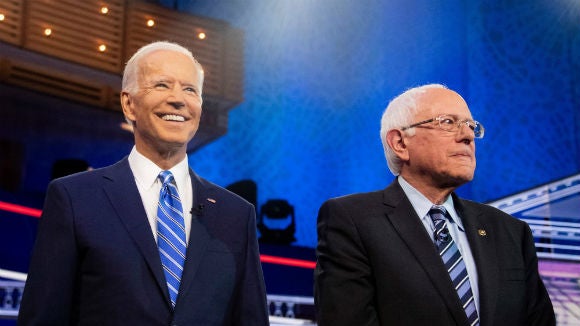What Super Tuesday means for the 2020 Election.

This past Tuesday, fourteen states, including California, Texas, and Minnesota, went out to vote for Democratic candidates in the primary. As its the day with the largest number of states holding primaries and caucuses, Super Tuesday is usually a strong sign of who will be the party’s nominee. In the weekend leading up to Super Tuesday, both Pete Buttigieg and Minnesota Senator Amy Klobuchar dropped out of the race and announced they would endorse current running candidate Joe Biden, former President Barack Obama’s Vice President. Last week, Mike Bloomberg dropped out after an unsuccessful Super Tuesday in which he only scored 23 delegates despite spending about $500 million on a 100-day campaign. He also set his endorsements towards Biden with Buttigieg and Klobuchar. Also dropping out – this Saturday – was Senator Elizabeth Warren, who did not announce any endorsement plans.
This means that it’s down to Joe Biden and Bernie Sanders vying for the Democrat’s presidential nominee, which the party will vote for at the Democratic Convention (Jul. 13-16 of this year). With four candidates dropping out within a week, and only two viable candidates left standing, it can be said – without a doubt – 2020’s Super Tuesday was a very important night for the Democratic party. But how important, and was this major election shift because of the polls or the eagerness of the Democratic party to get the current President out of office?
During Super Tuesday, Joe Biden won the most delegates and received the majority vote in ten of the fourteen states (Sanders earned four). At the time this article was written, Biden has a total of 670 delegates and Sanders has a total of 574. That puts Sanders 96 delegates less than Biden. While there are ballots that still have to be counted, Biden’s current edge makes it clear that he is the party’s current frontrunner. The questions we now have to ask are: does this solidify Biden winning the primary and can Sanders still win? As to the former, no. The current projections remain uncertain. The latter: yes, again, the projections can be misleading. That said, Sanders’ window of winning is getting narrow. Although the state of California was Sanders’ state to lose going in, and as he will most likely have gotten the majority once all ballots are counted, uncounted votes submitted through email may increase Biden’s numbers and the difference between the two’s numbers. The way primary votes are counted isn’t the same as the general election. Where the presidential election is a winner-take-all system, in which whoever receives the most votes in a state wins everything, primaries don’t have the top winner winning all delegates are counted. To qualify for delegates, you must receive at least 15% of the vote from a state primary or a congressional district. After that, you are awarded delegates based on the proportion of your performance in the primary. Basically, multiple candidates can get delegates, and on Tuesday, a slew of candidates got multiple. Leading candidates in the primaries – especially on Super Tuesday – can significantly affect polls. In this case, although there hasn’t been that much movement as of now, the polls could lean in Biden’s favor and away from Sanders.
And this doesn’t only have to do with delegates. Over the course of a week, multiple former candidates – with strong coalitions – have turned to support Biden. Just this weekend, we saw Senator Kamala Harris – who ran for president before dropping out in early December – also announce she would endorse Joe. Why is everyone doing this? The answer stems from the party wanting to get their nominee to the White House. To get a higher number of votes than the opponent, a strong coalition (having a great number of people backing you) is key to gaining the presidency. The Democrats, like any party, want someone from their team to win. This is why so many Democrats are dropping out as soon as possible and choosing to rally behind one candidate instead of dividing their Democratic votes into multiple.
Looking at the delegate count, the numbers have hinted at who the party is leaning towards. With Biden in the lead, it seems the party is choosing a moderate Democrat rather than a far-left one. Comparing the numbers of two moderates – Mike Bloomberg and Joe Biden – with two far-left ones – Elizabeth Warren and Bernie Sanders . With this, as well as many members of the Democratic party behind him, Biden could very well be the Democratic candidate heading into the 2020 Election. Again, Bernie still has a chance to win. He has a strong coalition, and, after Warren’s campaign ending, her followers may rally behind him.
Today, Big Tuesday’s primaries offer 352 delegates. Michigan awards about a third of those delegates, with 125. Besides Michigan, five other states vote as well, and Biden is once again in the lead, with Sanders attempting to regain the top spot. We’ll have to see who ends up on top, but, right now, much of the Democratic party seems to be in support of Joe Biden.

